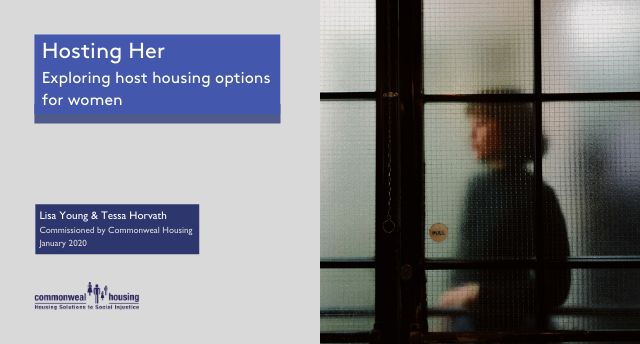
Women-specific hosting could help women facing impossible choices
Host housing schemes can be a positive option for some women but must be more women-focussed and where appropriate offer women-only hosting, finds a report published today by Commonweal Housing.
Hosting Her, by researchers Lisa Young and Tessa Horvath, explores how host housing schemes – which enable members of the public to offer a room in their house to someone in need – can support some homeless women when delivered well. It identifies key considerations for existing schemes and those delivering women-specific host housing in the future.
The report found that recruitment and vetting processes, training and support for hosts vary between existing hosting projects. Some schemes use DBS checks on all residents of the host property, whereas others do DBS checks on one host in the household only. One service described that some schemes do not use DBS checks at all, posing a risk to women’s safety.
21 of 23 interviewees from hosting and housing schemes, women’s services, guests and hosts, were supportive of women-specific hosting as a potential option for some women, reflecting on difficulties women face accessing appropriate accommodation. The report warns, however, that hosting must be delivered well and should not become a replacement for other housing options and specialist services for women.
The research finds that women-specific hosting schemes can offer some women facing homelessness a positive step towards independent living, particularly for those facing ‘impossible choices’ between male-dominated hostels, and sleeping on the streets. For women with No Recourse to Public Funds, host housing is often the only option.
While hosting schemes have become more common for groups such as young people, migrants and asylum seekers, new schemes are being developed for survivors of domestic violence and modern slavery. This report suggests that when delivered well, hosting can expand the options available to women while longer term housing is found, and with the right host, can provide a ‘supportive environment’ that can be complementary to recovery.
The report calls for host housing services and women’s services to work in partnership to develop projects that are tailored to meet women’s needs. This would require specific funding which enables a rigorous approach to the recruitment, training and ongoing wrap around support.
A full list of recommendations is outlined in the report. These include:
- Local authorities to work with local hosting schemes to ensure suitable move on accommodation for those who are eligible once the hosting placement ends.
- Host housing services to offer women only host housing options, to prioritise the safety of women, and to work with specialist women’s services to meet their needs.
- Women’s specialist services that seek to utilise hosting schemes, should consider working with host housing services, by providing gender-informed training to hosts and staff.
Lisa Young and Tessa Horvath, authors of the report say:
“Whilst it should never replace specialist services or statutory provision, host housing that is tailored to women’s needs could be an appropriate option for some women as a step towards independent living. Any further development of hosting must be alongside continued campaigning and lobbying for appropriate statutory, sustainable solutions for women.
“We hope this report shines a light on a previously under researched issue – and that any future host housing schemes for women are designed by and with specialist services and are tailored to meet the specific needs and experiences of women.”
Amy Doyle, Deputy Chief Executive of Commonweal Housing says:
“Whilst there is a growing number of women needing to access hosting schemes, it’s clear that not all the precautions around women’s safety are being addressed. We need to see schemes dedicated to supporting women that operate in a gender and trauma informed way, to keep these women safe and enable them to move on in their pathway to independence.”
For press inquiries, please contact: conniem@commonweal.org.uk

